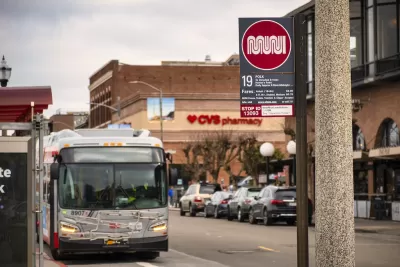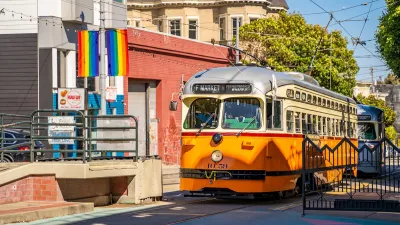The SFMTA is improving service at off-peak hours and on weekends to accommodate new travel patterns that rely less on weekday commuters. Ridership has increased accordingly.

The San Francisco Municipal Transportation Agency (SFMTA) transit system saw its highest ridership since the start of the Covid-19 pandemic this September, reports James Salazar for the San Francisco Examiner.
“The transit system averaged more weekday riders in September — 521,050, or about 74% of levels from the same month in 2019 — than any month since February 2020, crossing the threshold of 500,000 average weekday boardings for the first time since then, according to a newly published San Francisco Municipal Transportation Agency report.” Weekend boardings were at 92 percent of pre-pandemic levels, Salazar adds.
The agency acknowledges that the bulk of trips has shifted from office commuters to off-peak travelers, prompting SFMTA to make changes to routes to accommodate new travel patterns. “The agency rerouted the 22 Fillmore — the monthly ridership of which was at 122% of pre-pandemic levels — to serve additional parts of the emerging Mission Bay neighborhood. SFMTA also built transit-only lanes on 17th street, which Tumlin said helped the bus line’s speed and reliability.” According to SFMTA, subway delays have decreased by 50 percent since before the pandemic.
The system is refocusing its efforts on serving attendees to music festivals and other events in San Francisco, weekends that often see spikes transit ridership. According to SFMTA director Jeffrey Tumlin, “Chase Center event tickets doubling as Muni passes has driven ridership to the arena and its surrounding neighborhoods.”
FULL STORY: Muni crosses half-million monthly rider average for first time since 2020

Trump Administration Could Effectively End Housing Voucher Program
Federal officials are eyeing major cuts to the Section 8 program that helps millions of low-income households pay rent.

Planetizen Federal Action Tracker
A weekly monitor of how Trump’s orders and actions are impacting planners and planning in America.

Canada vs. Kamala: Whose Liberal Housing Platform Comes Out on Top?
As Canada votes for a new Prime Minister, what can America learn from the leading liberal candidate of its neighbor to the north?

Washington State’s Parking Reform Law Could Unlock ‘Countless’ Acres for New Housing
A law that limits how much parking cities can require for residential amd commercial developments could lead to a construction boom.

Wildlife Rebounds After the Eaton Fire
Following the devastation of the Eaton Fire, the return of wildlife and the regrowth of native plants are offering powerful signs of resilience and renewal.

LA to Replace Inglewood Light Rail Project With Bus Shuttles
LA Metro says the change is in response to community engagement and that the new design will be ready before the 2028 Olympic Games.
Urban Design for Planners 1: Software Tools
This six-course series explores essential urban design concepts using open source software and equips planners with the tools they need to participate fully in the urban design process.
Planning for Universal Design
Learn the tools for implementing Universal Design in planning regulations.
Central Transportation Planning Staff/Boston Region MPO
Heyer Gruel & Associates PA
Institute for Housing and Urban Development Studies (IHS)
City of Grandview
Harvard GSD Executive Education
Regional Transportation Commission of Southern Nevada
Toledo-Lucas County Plan Commissions





























